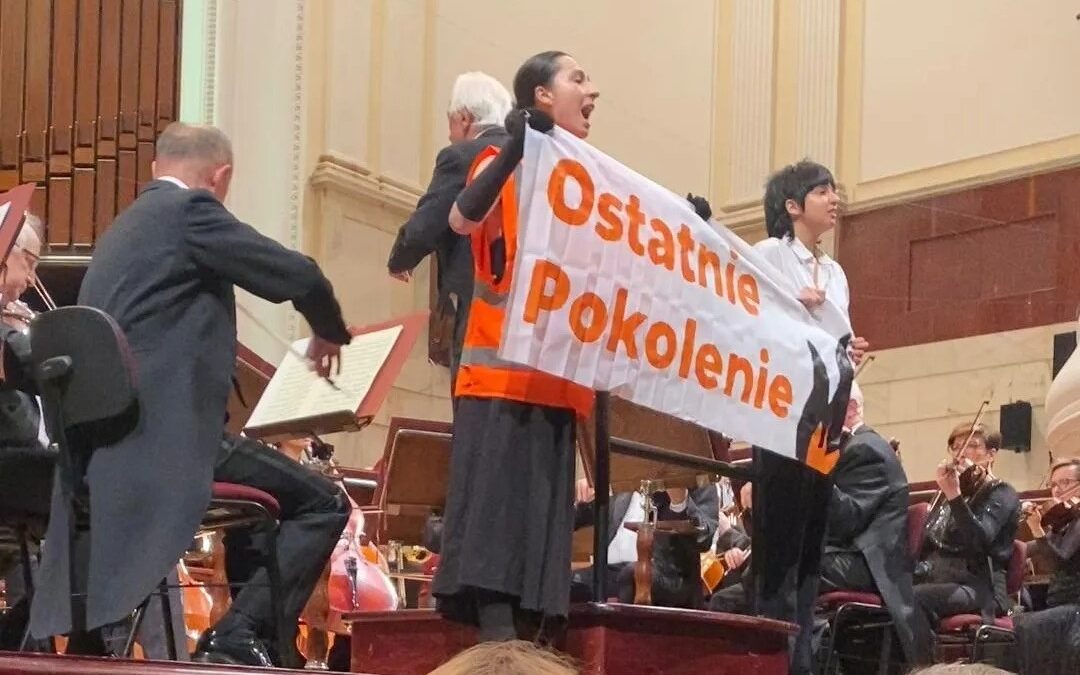Keep our news free from ads and paywalls by making a donation to support our work!

Notes from Poland is run by a small editorial team and is published by an independent, non-profit foundation that is funded through donations from our readers. We cannot do what we do without your support.
A Warsaw court has upheld the conviction of two climate activists who disrupted a concert at the National Philharmonic. It found that their actions, even if driven by valid motives, exceeded the limits of lawful free expression because they infringed upon the rights of others.
The incident in question occurred on 3 March 2024 during a performance at the concert hall, which is home to the Warsaw National Philharmonic Orchestra.
The two activists from the Last Generation climate movement walked onto the stage shouting: “This is an alarm. Our world is on fire. We are the last generation that can stop the climate catastrophe. We demand radical investment in public transport.”
"To jest alarm! Nasz świat płonie" pic.twitter.com/in31HVQ4mU
— Ostatnie Pokolenie (@OstatniePokolen) March 3, 2024
The incident lasted only about a minute before the women were escorted from the stage. The orchestra continued playing throughout. The activists were later charged with disturbing public order.
In December, Warsaw’s district court found them guilty, calling their actions “reprehensible in the light of social assessments and accepted norms”. They were sentenced to 20 hours of unpaid community service.
The defendants appealed the ruling, arguing that the protest was peaceful, caused no harm to the audience, and that the punishment was disproportionate. Their defence lawyer, Jarosław Jagura, told the court that the women had exercised their constitutional right to protest and had not disrupted the concert.
“Freedom of expression is fundamental and vital for civil society,” he said during the hearing, quoted by the Polish Press Agency (PAP). One of the activists reportedly told the court that they had chosen the National Philharmonic to “break taboos” and reach audiences in ways not possible through regular protests.
However, on Thursday this week, their appeal was rejected. “The rights to freedom of speech, to expression, to peaceful assembly are not absolute rights,” said judge Małgorzata Rutkiewicz-Rząsa. “They are subject to limitations when they conflict with other rights and freedoms.”
She acknowledged that the defendants’ motivation was socially valid, but stressed that “the end does not justify the means” and “the manner in which freedom was exercised exceeded the permissible limits and infringed other rights and freedom”.
“To condone this kind of behaviour would mean that in virtually any space, anyone with any kind of message could disrupt the functioning of an institution,” added the judge.
PM @donaldtusk has condemned road blockades by climate activists that have paralysed parts of Warsaw and has pledged “decisive” action against the protests.
The interior minister, meanwhile, says the police will “ruthlessly fight” against the blockades https://t.co/vMEJGTpBsO
— Notes from Poland 🇵🇱 (@notesfrompoland) December 3, 2024
Last Generation is a climate movement active in several European countries. The group is known for staging disruptive protests, including road blockades, interrupting public events, and acts of vandalism targeting symbolic sites.
In December, Polish Prime Minister Donald Tusk condemned the group’s long-running campaign of blocking roads during peak hours and pledged to take “decisive” action against the protests.
This month also saw the start of the trial of two other Last Generation activists who splashed a statue of the Warsaw mermaid – a symbol of the city – with washable paint made from starch and food dye. Last month, the group vandalised and occupied a monument in Warsaw to the victims of the Smolensk air disaster.
Climate activists from the Last Generation movement have vandalised and occupied a monument in Warsaw dedicated to the Smolensk air disaster that killed 96 people, including President Lech Kaczyński.
Tomorrow marks the 15th anniversary of the crash https://t.co/viyTYSGQEg
— Notes from Poland 🇵🇱 (@notesfrompoland) April 9, 2025
In 2022, while still in opposition, Tusk admitted that his generation “was wrong” in its approach to climate and promised to take action to reduce emissions. When a climate activist interrupted his speech, he told security not to remove her and invited her to the centre of the stage.
However, since coming to power in December 2023, his government has largely failed to enact its promised acceleration away from coal, which last year still generated almost 57% of Poland’s electricity.
A 2022 study ranked Poland as the European Union’s least green country. Meanwhile, research from last year showed that the proportion of people in Poland who are prepared to make changes and sacrifices in their own lives to combat climate change decreased from 13% in 2022 to just 5% in 2024.
Just 5% of people in Poland say they are prepared to make changes and sacrifices in their own lives to combat climate change, down from 13% in 2022.
The proportion who believe human actions threaten the environment has fallen from 63% in 2019 to 52% now https://t.co/PpSGXD2Zed
— Notes from Poland 🇵🇱 (@notesfrompoland) November 12, 2024

Notes from Poland is run by a small editorial team and published by an independent, non-profit foundation that is funded through donations from our readers. We cannot do what we do without your support.
Main image credit: Ostatnie Pokolenie / Facebook.com

Alicja Ptak is deputy editor-in-chief of Notes from Poland and a multimedia journalist. She has written for Clean Energy Wire and The Times, and she hosts her own podcast, The Warsaw Wire, on Poland’s economy and energy sector. She previously worked for Reuters.



















